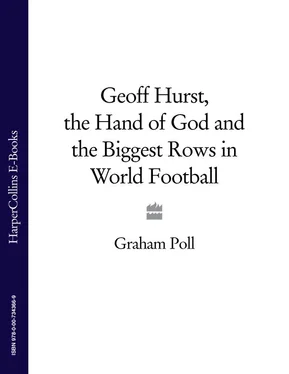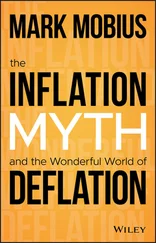1 Reputations on the Line
THE MATCH
On the one occasion England won the World Cup, the Final swung in our favour because the match officials gave a goal when the ball did not cross the line. I would like to think that now, more than forty years on, the officials would get it right if a similar incident occurred. Yet the thing that scares me is that they might not. The 2010 World Cup Final could be determined by a ‘goal’ that is not a goal, and this time it might be England who lose out.
By stating that modern referees and assistants ought to get it correct, I am not saying that makes me, or any of the current refs, better than the man in charge that day in 1966, Gottfried Dienst. I am not saying that at all. I can understand how and why, in the circumstances of the time, the goal was allowed. But the world has changed and so has refereeing.
It would have been a bit difficult for me to ref the 1966 Final, because it was the day after my third birthday. It was before some of you were born, no doubt. But football folk know that one of England’s goals was among the most dubious ever allowed in a major match.
So let’s go back to the sunny afternoon of 30 July 1966. Wembley was full but the country’s streets were empty. The nation was watching black and white TV coverage of the World Cup Final. An astonishing drama unfolded.
Helmut Haller shot West Germany into the lead after twelve minutes but, seven minutes later, Geoff Hurst headed an equalizer. Then, deep into the second half, Martin Peters scored. It was 2-1 to England. We thought we’d won. But, as the very last seconds ebbed away, the Germans were given a free-kick. George Cohen blocked it but the ball bobbled across the six-yard box…and Wolfgang Webber dived in, feet first, to score. It was 2-2. Extra-time.
Alf Ramsey, the England manager, told his troops, ‘You have won the World Cup once. Now go and win it again’, and eleven minutes into the extra period, Alan Ball galloped down the right and slung in a low cross. It went behind Hurst, who had to stop and turn around, so he had his back to goal when the ball reached him. He controlled it with the inside of his right foot, swivelled around, took a couple of staccato steps and slammed in a shot against the bar. The ball ricocheted down…
On BBC television, Kenneth Wolstenholme described the tense events. ‘Ball, running himself flat. Now Hurst. Can he do it? He has done! Yes! Yes. NO! No. The linesman says No.’ There was a long pause. Then Wolstenholme repeated, in a deflated tone, ‘The linesman says No.’
The little referee, Herr Dienst, bustled over to the much taller linesman, Tofik Bakhramov. No more than three or four words were exchanged. Abruptly, the referee turned towards the halfway line, put his whistle to his mouth and blew. Wolstenholme screamed, ‘It’s a goal! It’s a goal!’ His ecstatic response must have been matched in front rooms and parlours all over England.
The goal was awarded, and it turned the tide of the match emphatically and decisively in England’s favour. Just before the end of the second period of extra-time, as Hurst loped up field one more time, there was some more memorable commentary. Wolstenholme ad-libbed the lines that have become immortal. ‘Some people are on the pitch. They think it’s all over. It is now!’ Hurst had drilled another shot into the German net. It was 4-2. England were champions of the planet.
When we consider the controversy over Hurst’s crucial second goal, the remarkable thing is that there wasn’t any. There was no dissent at all at the time. Hurst, who was eventually knighted for his heroics, will tell you that not a single day has passed since 30 July 1966 without someone debating whether the ball crossed the line. But there was no argument during the game. Watching the footage again, the most astounding aspect (apart from the fact that the linesman had a belt and a substantial belly!) was how genteel it all was. Our chaps did not harangue the ref to give the goal. When he did, there was not even a whimper from the Germans.
In the modern game, players have tantrums if throw-in decisions go against them. If the events of 1966 were repeated now, there would be riots. Yet only Webber of Germany and our Roger Hunt ambled over as the referee went to talk to the linesman. Neither player said anything. Once the decision had been made, Webber reached out briefly (as if about to tap the ref on his shoulder from behind and say something), thought better of it, withdrew his arm, meekly jogged into position and readied himself for the restart.
While I was writing this book, I was at a lunch and found myself sitting next to Roger Hunt. I asked him two questions. The first was, ‘Why didn’t you bang the ball in to make sure when it bounced down from the bar?’ People have always pointed to the fact that he did not do so as evidence that he must have believed the ball had already crossed the line. But he said that he couldn’t have got to it in time. A defender nipped in and headed the ball away over the bar. My second question was, ‘Why didn’t the England players and the West Germans crowd around the ref and the linesman?’
He replied, ‘We wouldn’t have dreamed of doing that. It wouldn’t have occurred to us to do that. The referee said it was a goal, so it was a goal.’
There were far fewer TV cameras and, remember, no replays. When something happened during a match, you saw it from one angle at normal speed and nobody was able to review it. So nobody was sure whether the ball had crossed the goal-line or not. Nobody saw the incident again after it had happened—not Wolstenholme, nor any of the media, nor anyone sitting at home. They were forced to rely on an independent arbiter—the linesman—and accept his ruling.
Admittedly, it was not always peace and tranquillity, even in those days. In England’s 1966 quarterfinal, Argentina’s captain, Antonio Rattin, was sent off but refused to leave the pitch for several minutes. Yet mostly, when there was uncertainty about events, players were much more prepared to take the word of the neutral judges—the match officials. Times change. But the role of the referee and assistants has not. They are still merely independent arbiters. It is the attitude towards them that has changed.
That said, it wasn’t a goal! When I talked to Roger Hunt at that lunch in December 2008 he was still unequivocal in his belief that it was, that the ball did cross the line. But the Germans never thought it was a goal, and the day after the Final some newspaper photographs appeared to show the ball bouncing on the line and not over it. Those pictures cast the first shadows of real doubt in this country. Then, months later, a film of the 1966 World Cup was released. It was called Goal!but showed more clearly that it wasn’t a goal. The film included the first slowed-down footage of the ball bouncing down from the crossbar. Since then, as film and television technology has developed, it has become possible to look at the incident frame by frame. Computer simulations of the moment have been created. It wasn’t a goal. It was such an injustice, in fact, that the expression ‘Wembley tor’ has entered the German vernacular. It is used to describe anything undeserved.
The more you look at it, the more difficult it becomes to work out why the linesman convinced himself that the ball had completely crossed the line. It was a brave decision by Tofik Bakhramov, but it was wrong, and a major factor was probably that he was not a specialist linesman. Before 1994, only referees went to World Cups. No linesmen went, so the refs took turns at running the lines. Bakhramov was the top ref in Azerbaijan and would not have operated regularly as a linesman for many years. These days a specialist ‘assistant referee’ would get the job. I know, to my cost, that they can make mistakes as well, but they are much less likely to do so than someone who usually referees and then suddenly has to use the different set of skills needed on the line. We’ll have a look at the linesman’s job in Chapter Two, when we deal with the 2006 World Cup Final and Zinedine Zidane’s sending off. But for now, let’s just agree that being a linesman is something that needs practice—and that Bakhramov was out of practice.
Читать дальше












